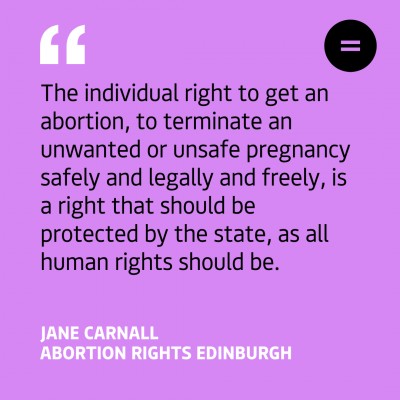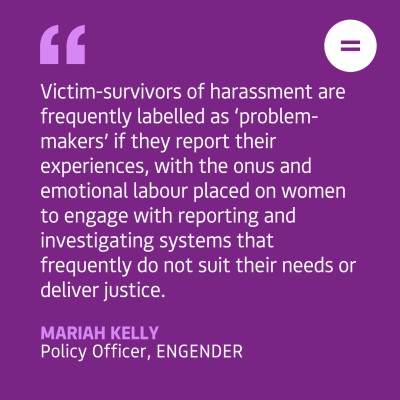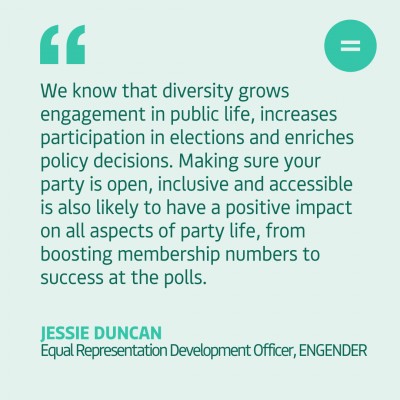Engender blog
All of Engender’s latest news. Reports, reviews, books, articles, and information from across Scotland’s women’s sector.
We would love to hear from other feminists around Scotland. Check out our guidelines for more information on how you can blog for us.
GUEST POST: Stand with the pro-choice voice across the US
Feminist across the world have continued to watch in horror as reproductive rights are under attack in the USA. In this blog, Jane Carnall, an activist with Abortion Rights Edinburgh sets out why we must act in solidarity with those seeking access to abortion in the states.

This month, a law passed by the Republican majority governing Texas came into force, and effectively banned all legal abortion in the state of Texas after six weeks gestation - that is, well before most people would even realise they're pregnant.
On 2nd October, Abortion Rights Scotland is taking part in the international day of action against this legislation.
Incorporating CEDAW - what a new human rights bill could do for women in Scotland
Last week marked the start of Incorporation Fortnight – a two week campaign led by the Human Rights Consortium Scotland focused on human rights incorporation and a new human rights law for Scotland. In this blog, our Policy and Parliamentary Manager Eilidh Dickson explores incorporation of CEDAW and what it could mean for women in Scotland.
-400.png)
Just before the May 2021 election, the then Scottish Government announced its intention to bring in a new human rights bill in the next parliament that would serve as a new human rights framework for Scotland.
Following years of work by the Taskforce on Human Rights and the Advisory Group on Human Rights, the Scottish Government accepted the recommendation that such a Bill should incorporate a range of international human rights treaties, including the United Nations Convention on the Elimination of All Forms of Discrimination Against Women (CEDAW). Most parties shared this commitment at the election and work on the bill is imminent.
Engender has long called for incorporation of CEDAW into Scots Law (read our report here) and we're excited to get to work on the bill process because of the opportunities we see for progressing substantive equality between women and men in Scotland. In this blog, we set out further what incorporation is and could mean for women in Scotland.
Tell us about your experiences of workplace sexual harassment
 Over the past year, Engender have been thinking about what needs to change to eradicate sexual harassment at work. Now we are asking women in Scotland to tell us about their experiences of sexual and sexist harassment in the workplace.
Over the past year, Engender have been thinking about what needs to change to eradicate sexual harassment at work. Now we are asking women in Scotland to tell us about their experiences of sexual and sexist harassment in the workplace.
We outlined our approach to this project in a blog post in April 2021, which has included convening an Expert Working Group to generate policy recommendations aimed at preventing and better responding to harassment; commissioning a literature review on anonymous reporting of sexual harassment; and engaging with women with lived experience of harassment.
Women’s experiences of sexual harassment in Scotland
Harassment tends to be normalised in the workplace and beyond, meaning that many women doubt that their experiences are serious enough to report, or that they happened at all. Behaviours constituting harassment tend to be minimised, with the suggestion being that women have invited it in some way or that it is harmless ‘banter’. Of course, this is never the case.
Supporting Political Parties to achieve Equal Representation in Politics
Political parties have a unique role in achieving equal representation at all levels of government. Engender have been working with partners on the Equal Representation Coalition to develop the Equal Representation in Politics Toolkit, a set of resources to support political parties to assess their current practice and to become as inclusive as possible. The ultimate goal is to see more women, minority ethnic, LGBTI and disabled people get involved, become candidates and get elected. Here, our Equal Representation Development Officer Jessie Duncan writes about representation in Scottish politics and how the Toolkit can support parties to be proactive within their own structures to increase diverse representation.

When it was formed in 1999, Holyrood raised the bar for gender equality in political representation in Scotland (and the UK) with women making up 37.2% of MSPs, reaching a high of 39.5% in 2003. Then followed three successive elections of decline and stagnation, with figures hovering in the 33-35% range.
The early promise of Holyrood as a place where politics can better represent the communities it serves feels alive again after the 2021 election. Significant strides have been made in some areas, with women making up a record 45% of MSPs including the first two women of colour and the first permanent wheelchair user. These are gains to be celebrated, however they did not happen by accident.
Free period products, when and where we need them
In this blog, Engender's Communications and Engagement Manager, Alys Mumford, talks about our continuing work to ensure access to free period products.
A common trope seen in film and TV is a woman being caught short in a nightclub toilet and being met with dozens of new friends proffering tampons and pads. And while I do have experience on both sides of this scene, I also have memories of sneaking a pad up the sleeve of my school jumper when going to the loo, wearing a hoodie tied round my waist on a freezing day in case I was leaking, using a code word to talk about tampons on holiday (‘cereal bars’ in case you’re wondering, and no I can’t remember why), and stressing out when a borrowed tampon had an applicator which I’d never used before.
Lack of access to appropriate period products can also lead to girls missing school, women having to take days off from paid work, people using unhygienic alternatives such as newspaper, and withdrawing from leisure activities.
Downloads
 Engender Briefing: Pension Credit Entitlement Changes
From 15 May 2019, new changes will be introduced which will require couples where one partner has reached state pension age and one has not (‘mixed age couples’) to claim universal credit (UC) instead of Pension Credit.
Engender Briefing: Pension Credit Entitlement Changes
From 15 May 2019, new changes will be introduced which will require couples where one partner has reached state pension age and one has not (‘mixed age couples’) to claim universal credit (UC) instead of Pension Credit.
 Engender Parliamentary Briefing: Condemnation of Misogyny, Racism, Harassment and Sexism
Engender welcomes this Scottish Parliament Debate on Condemnation of Misogyny, Racism, Harassment and Sexism and the opportunity to raise awareness of the ways in which women in Scotland’s inequality contributes to gender-based violence.
Engender Parliamentary Briefing: Condemnation of Misogyny, Racism, Harassment and Sexism
Engender welcomes this Scottish Parliament Debate on Condemnation of Misogyny, Racism, Harassment and Sexism and the opportunity to raise awareness of the ways in which women in Scotland’s inequality contributes to gender-based violence.
 Gender Matters in Social Security: Individual Payments of Universal Credit
A paper calling on the Scottish Government to automatically split payments of Universal Credit between couples, once this power is devolved to the Scottish Parliament.
Gender Matters in Social Security: Individual Payments of Universal Credit
A paper calling on the Scottish Government to automatically split payments of Universal Credit between couples, once this power is devolved to the Scottish Parliament.
 Gender Matters Manifesto: Twenty for 2016
This manifesto sets out measures that, with political will, can be taken over the next parliamentary term in pursuit of these goals.
Gender Matters Manifesto: Twenty for 2016
This manifesto sets out measures that, with political will, can be taken over the next parliamentary term in pursuit of these goals.
 Scottish NGO Briefing for UN Special Rapporteur on Violence Against Women
Joint briefing paper for the UN Rapporteur on Violence Against Women.
Scottish NGO Briefing for UN Special Rapporteur on Violence Against Women
Joint briefing paper for the UN Rapporteur on Violence Against Women.

Newsletter
Sign up to receive our newsletter here:
Sign up to our mailing list
Receive key feminist updates direct to your inbox: